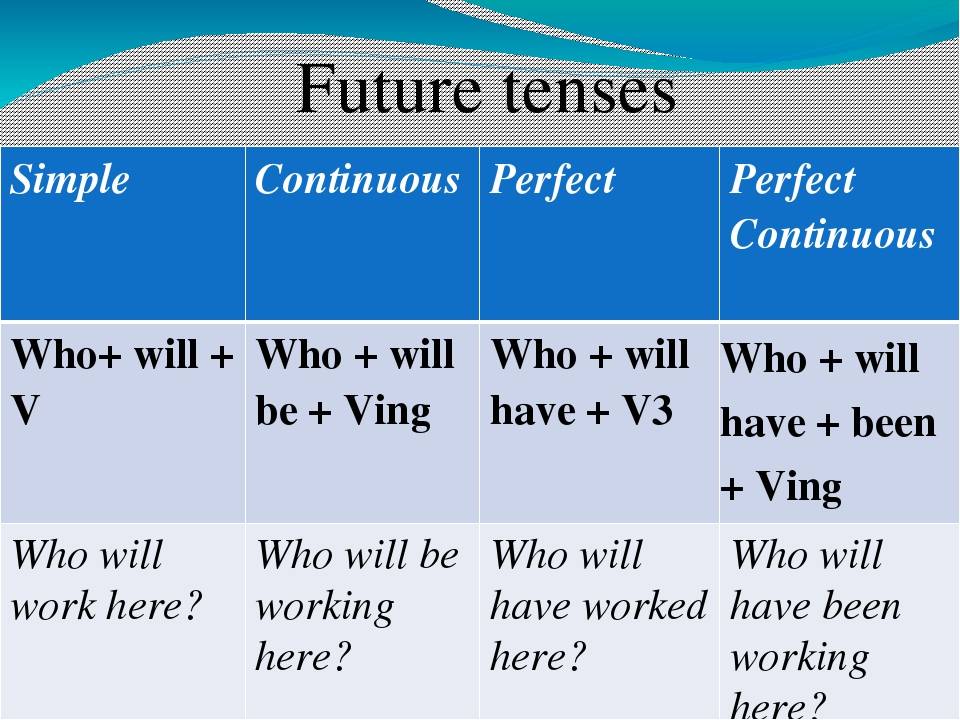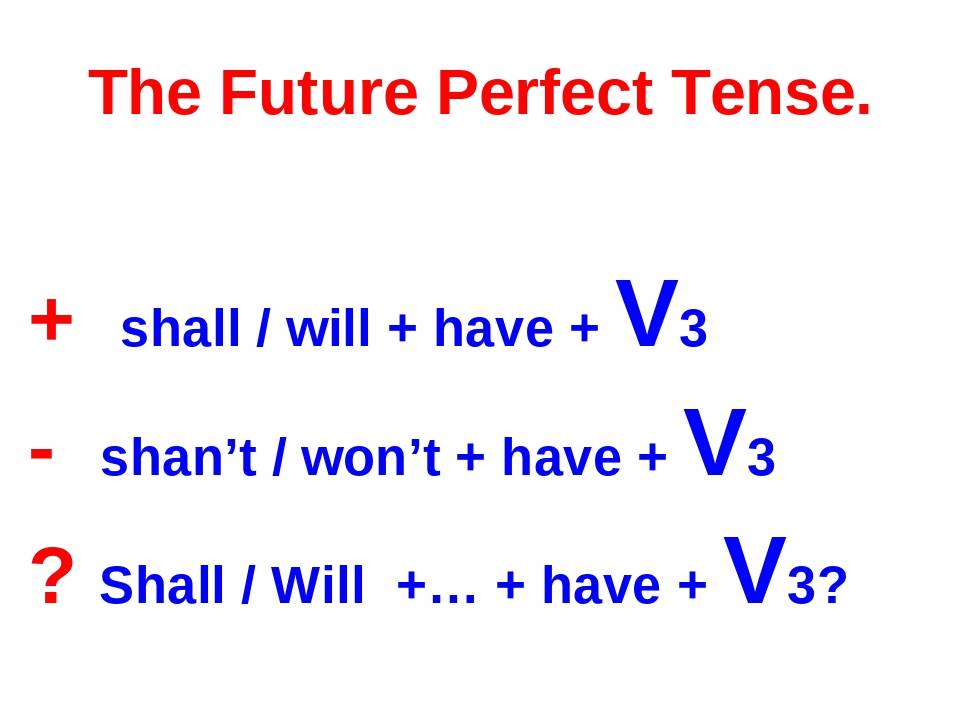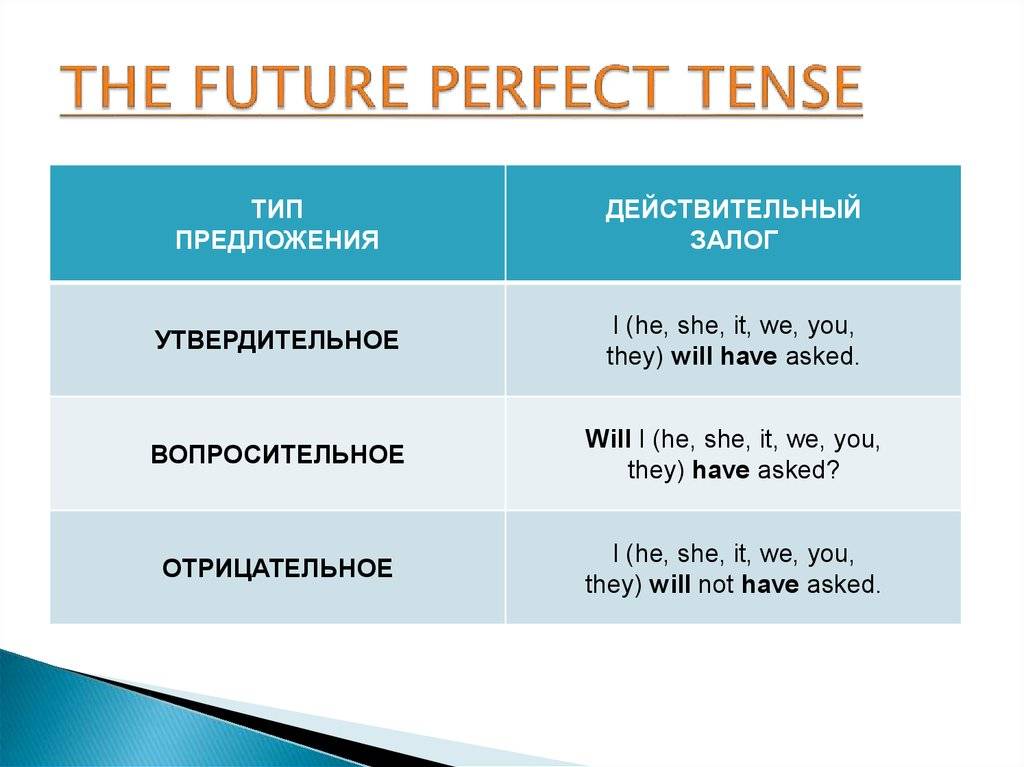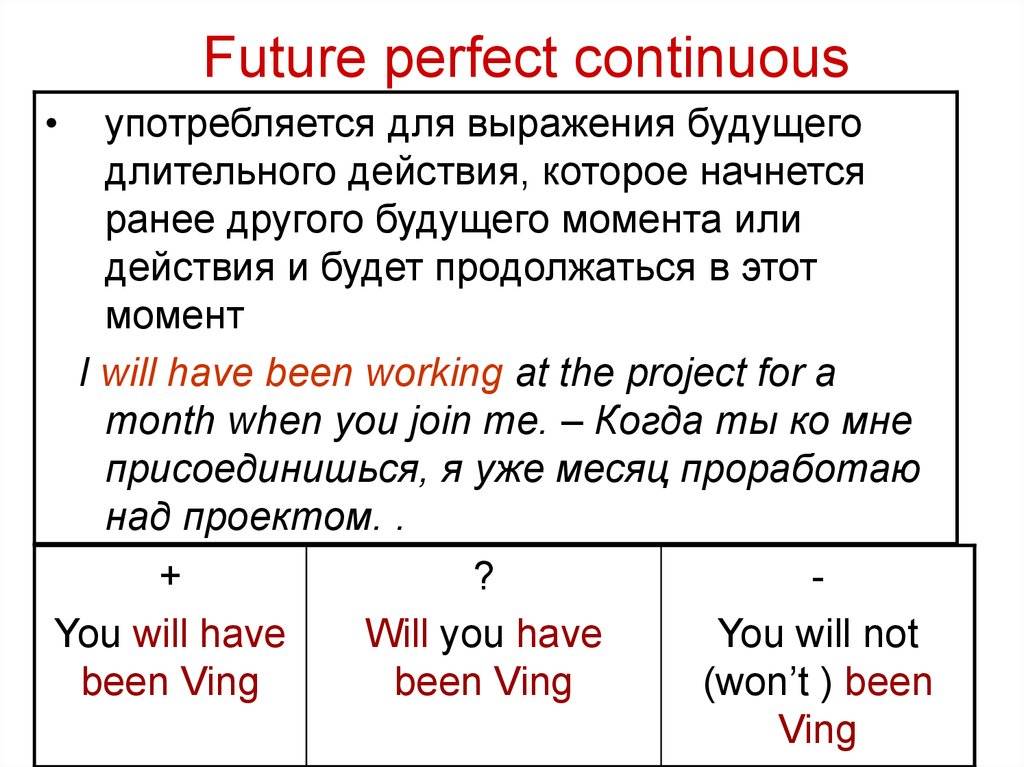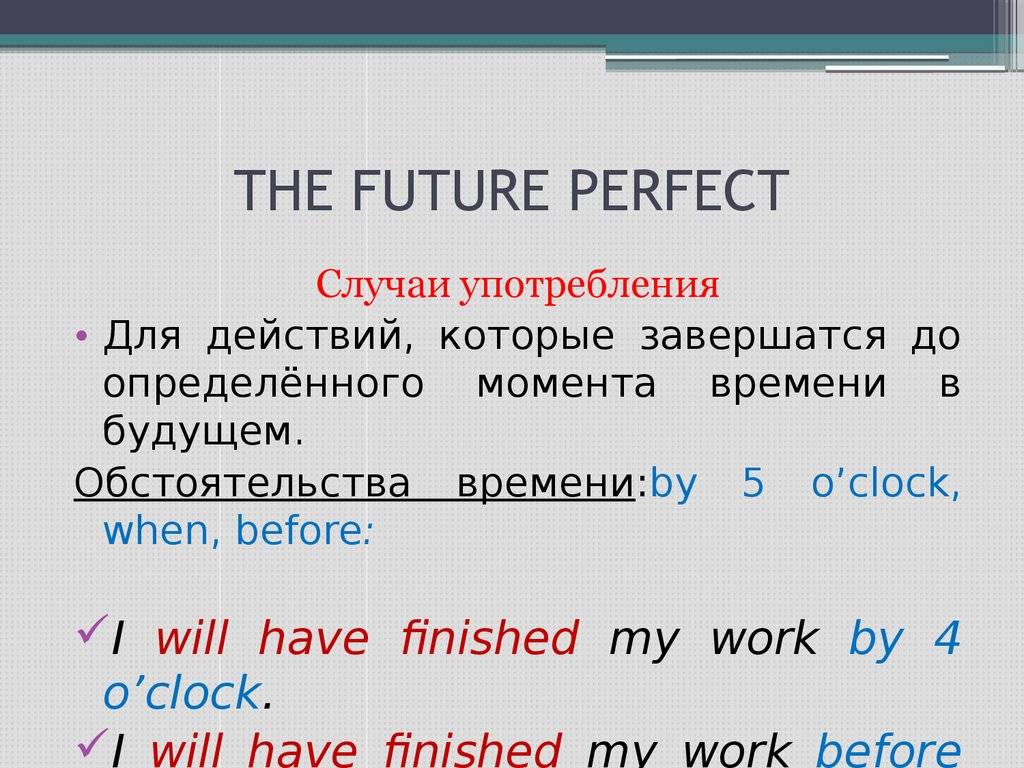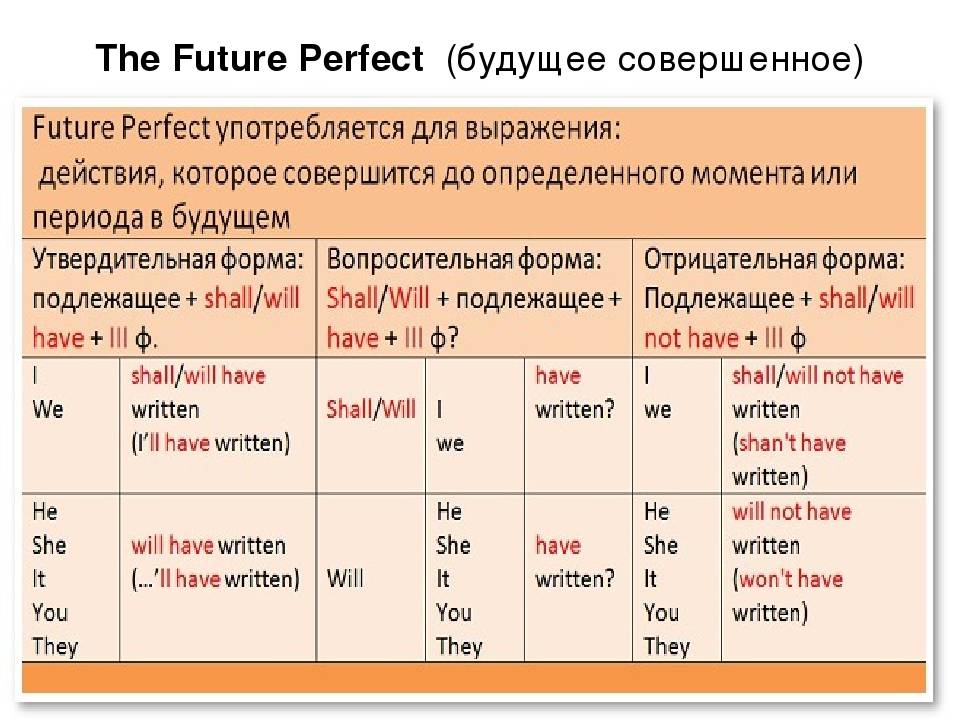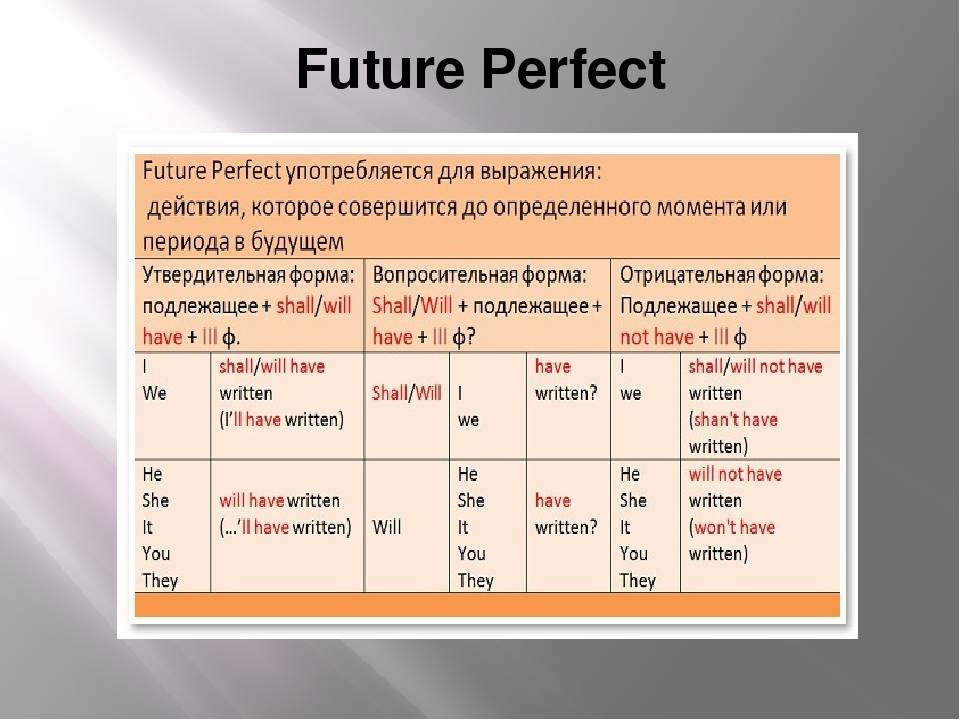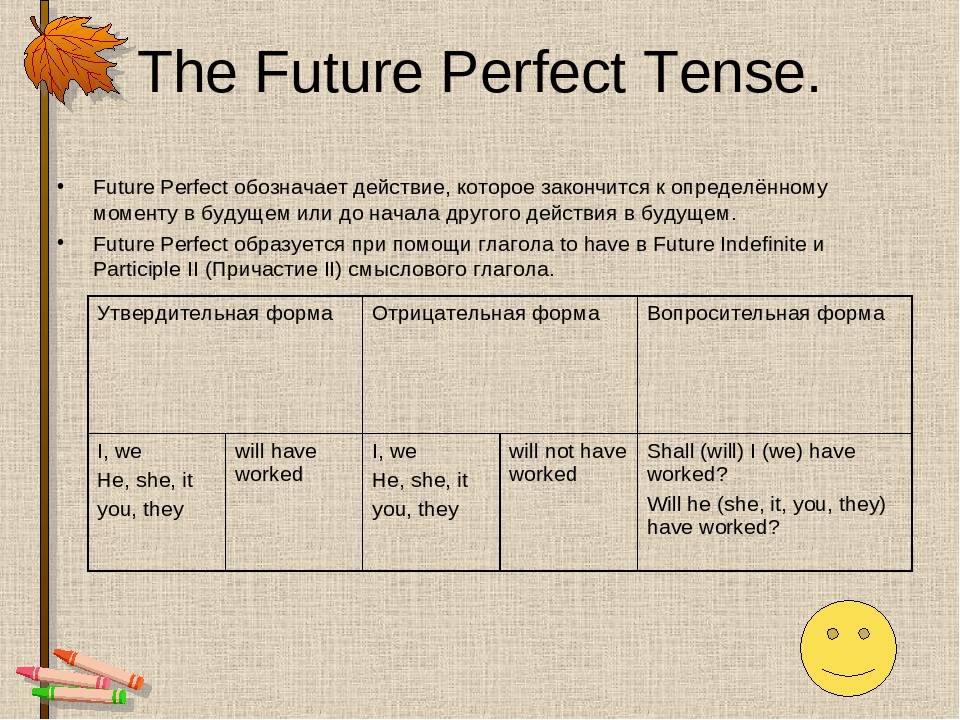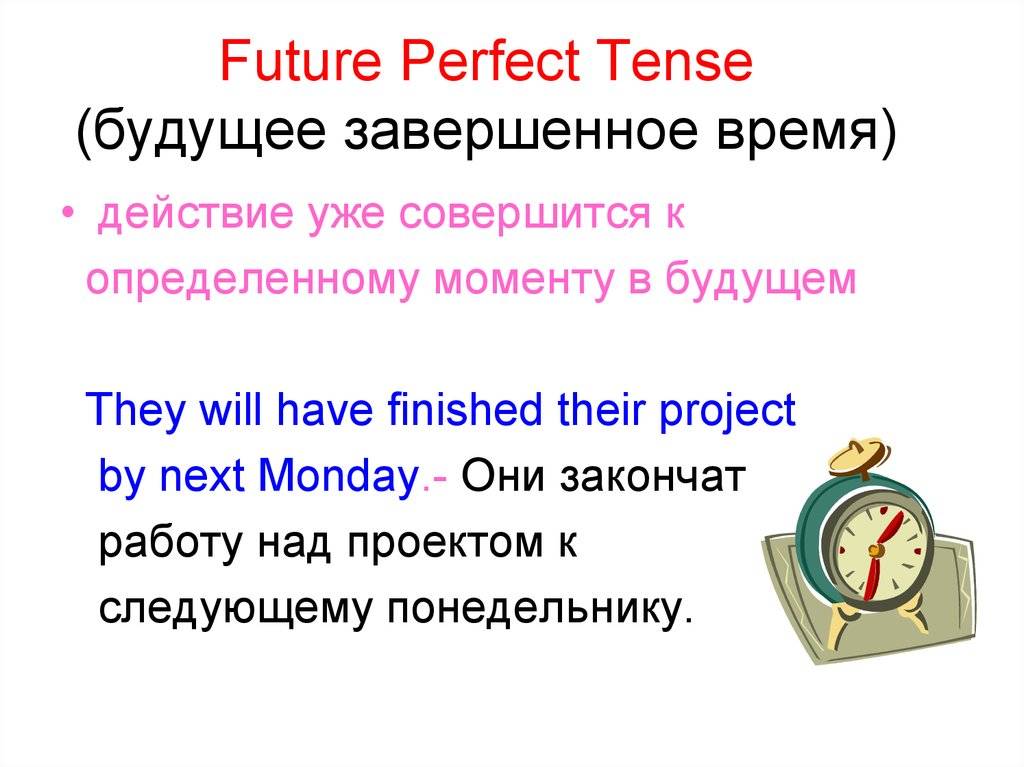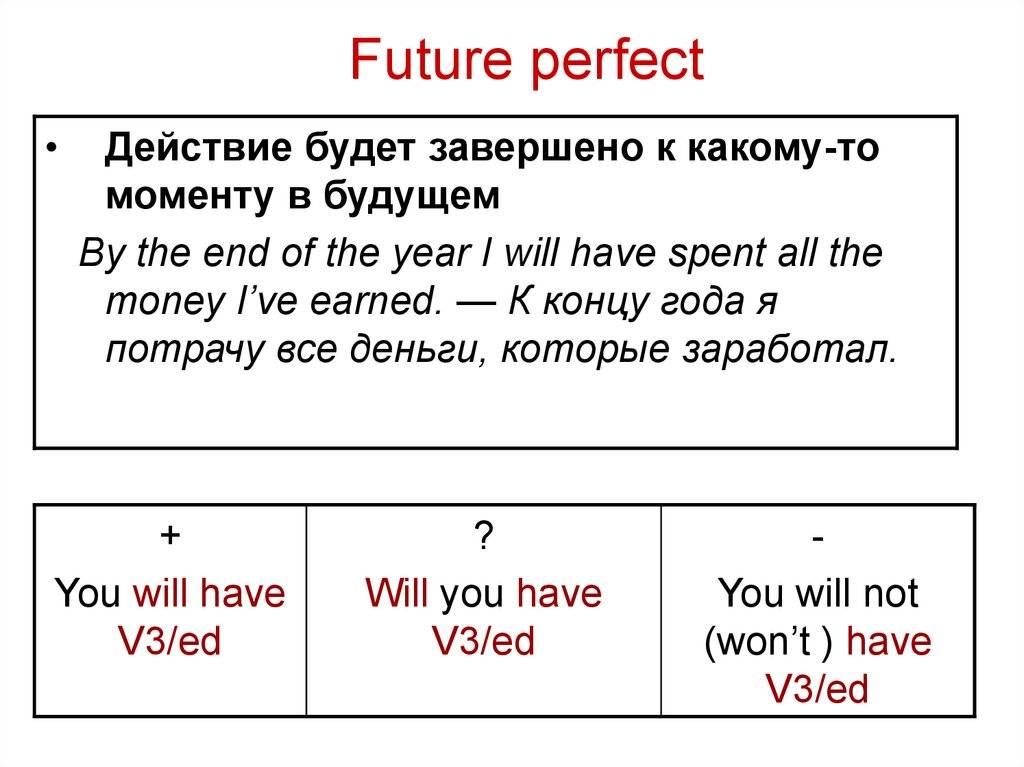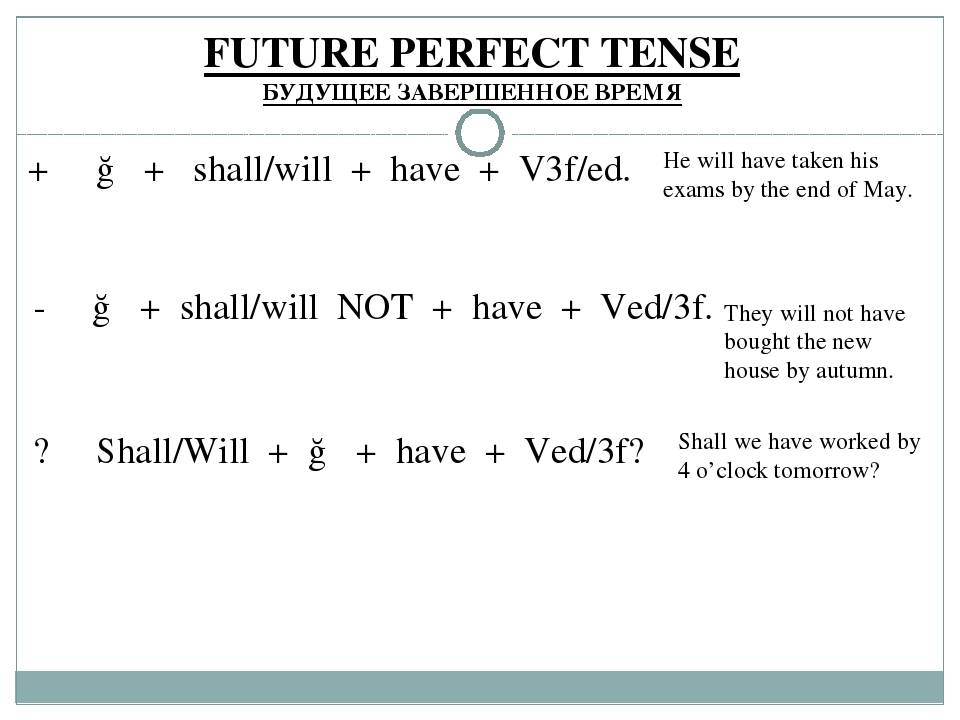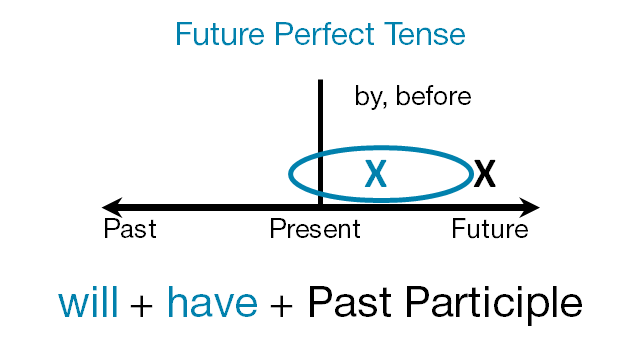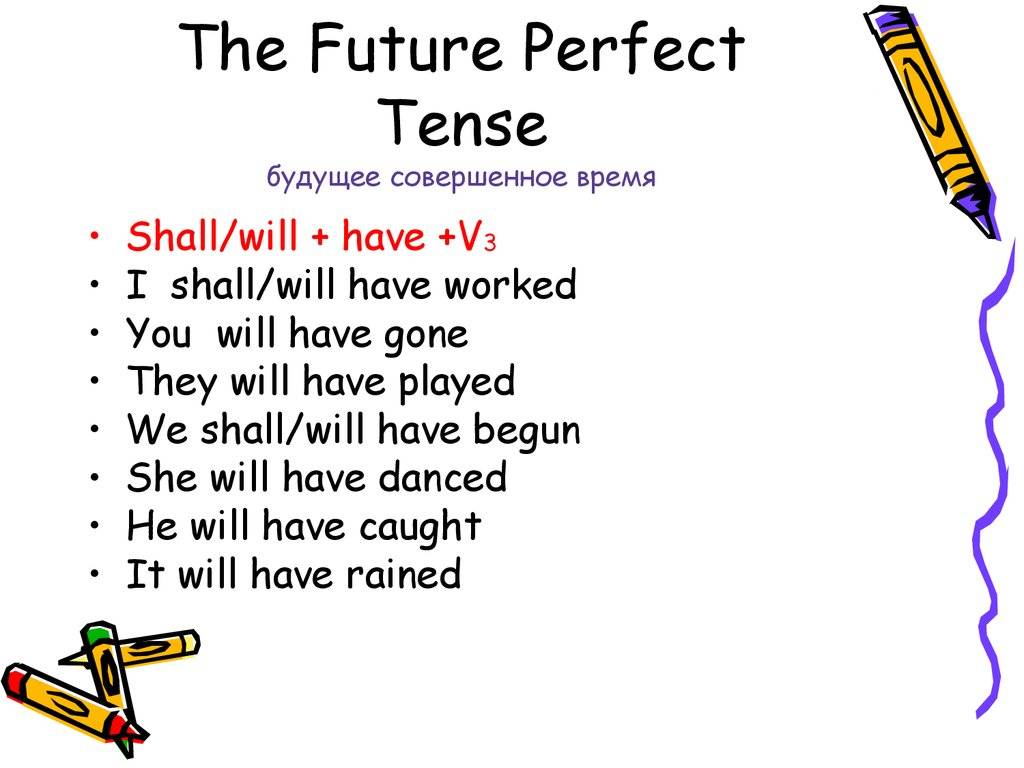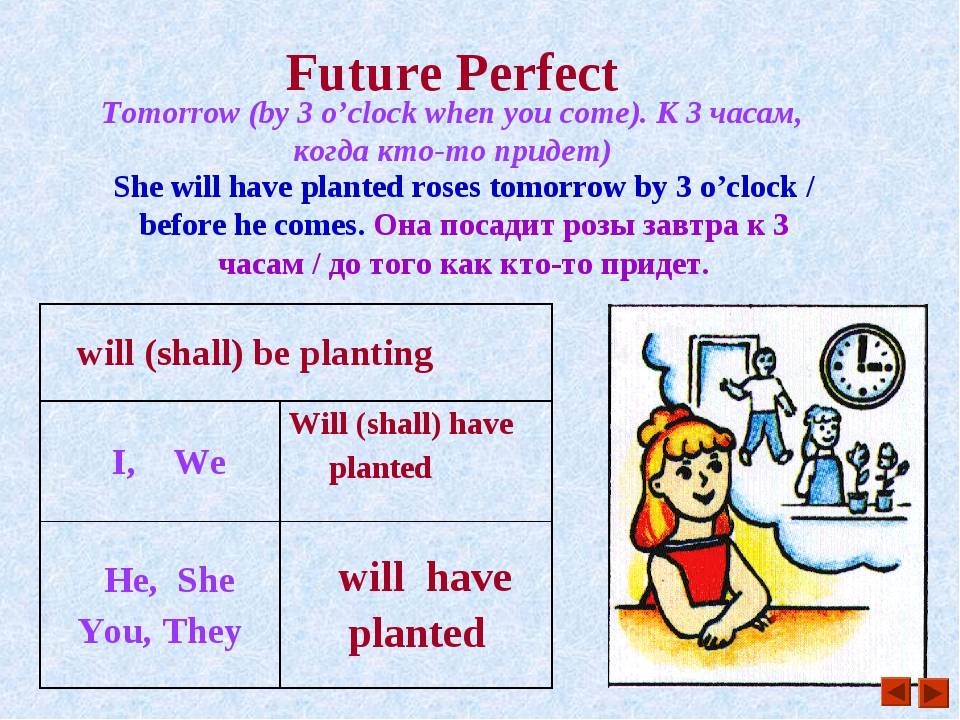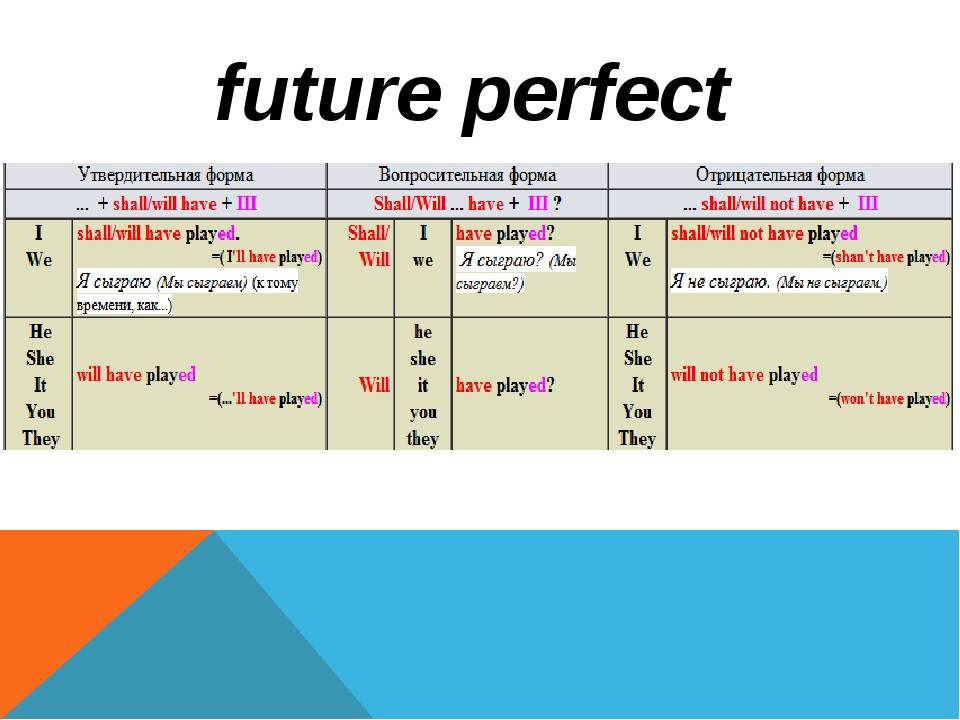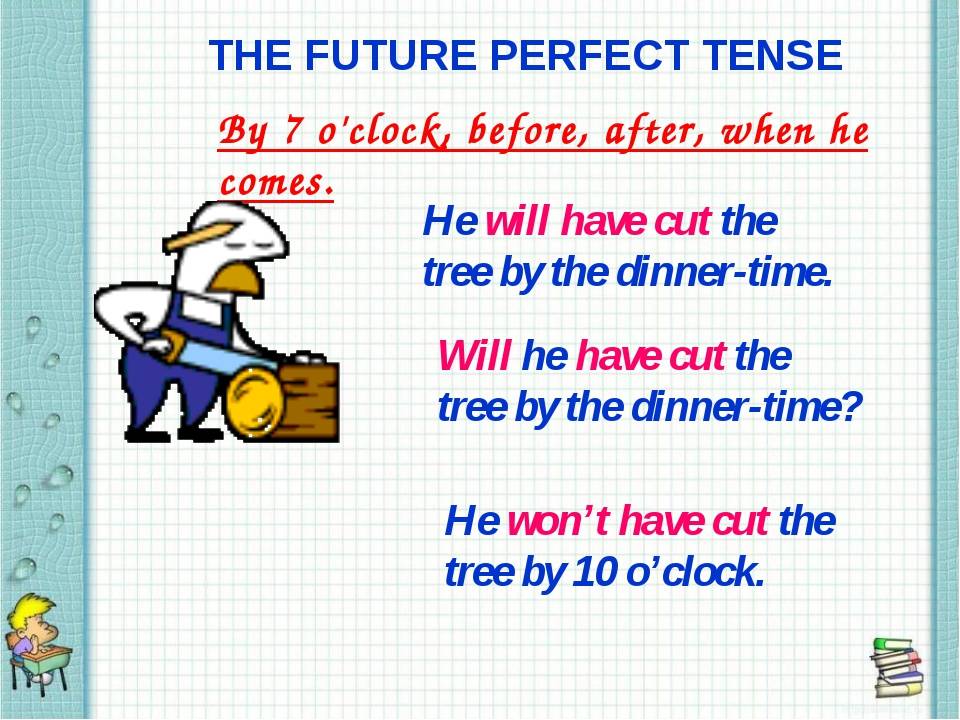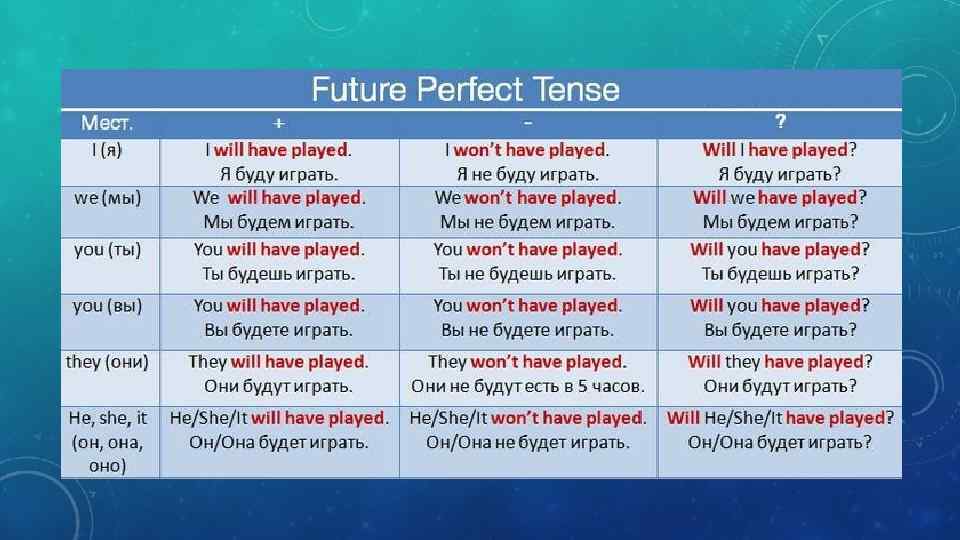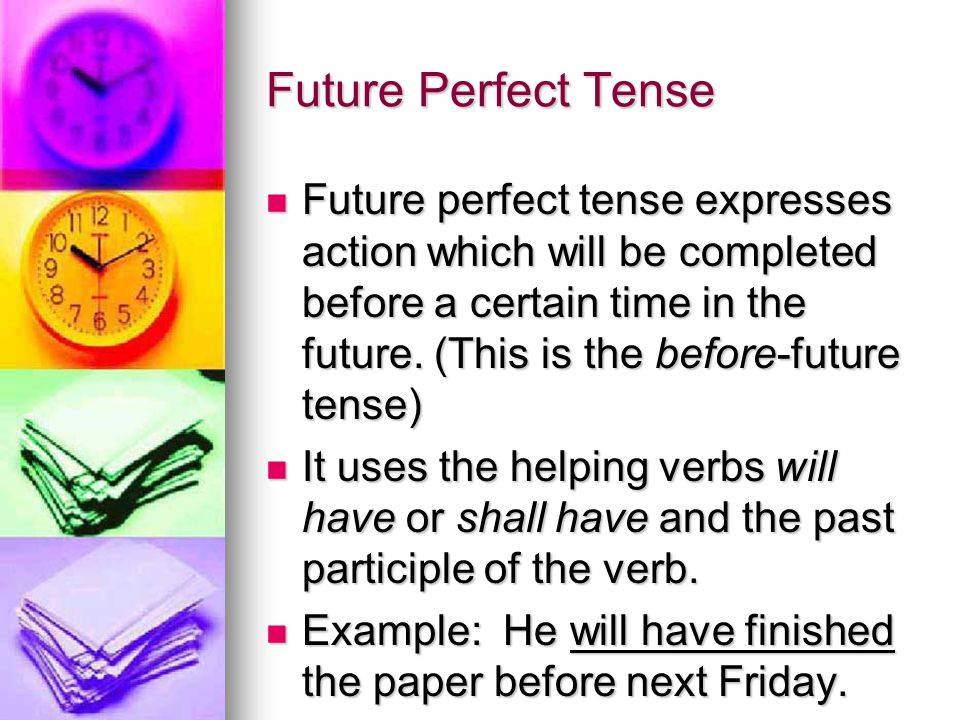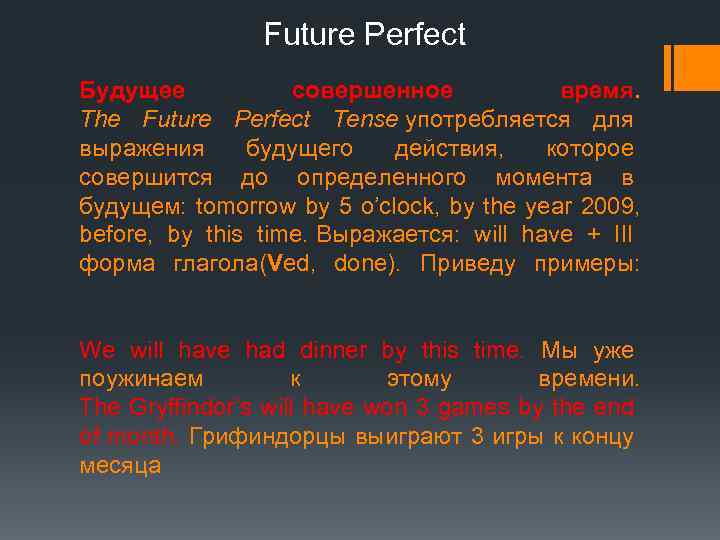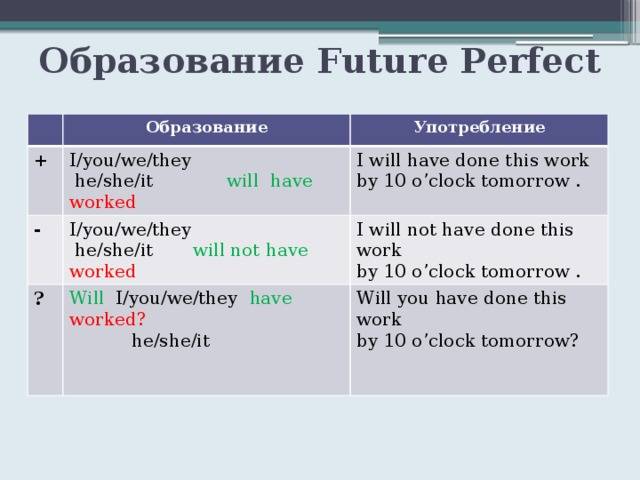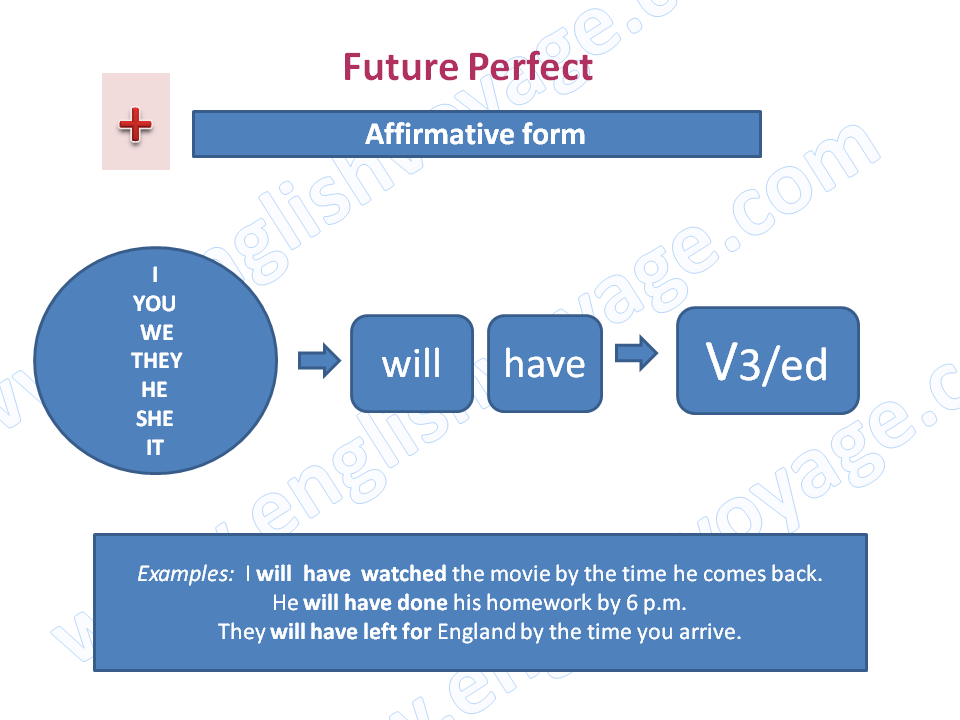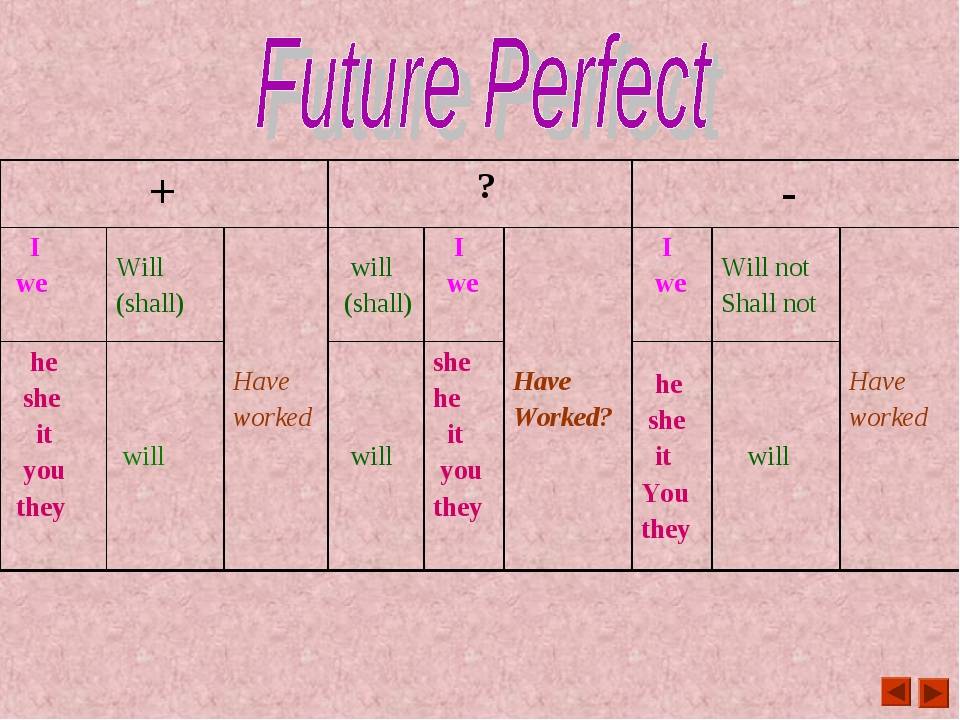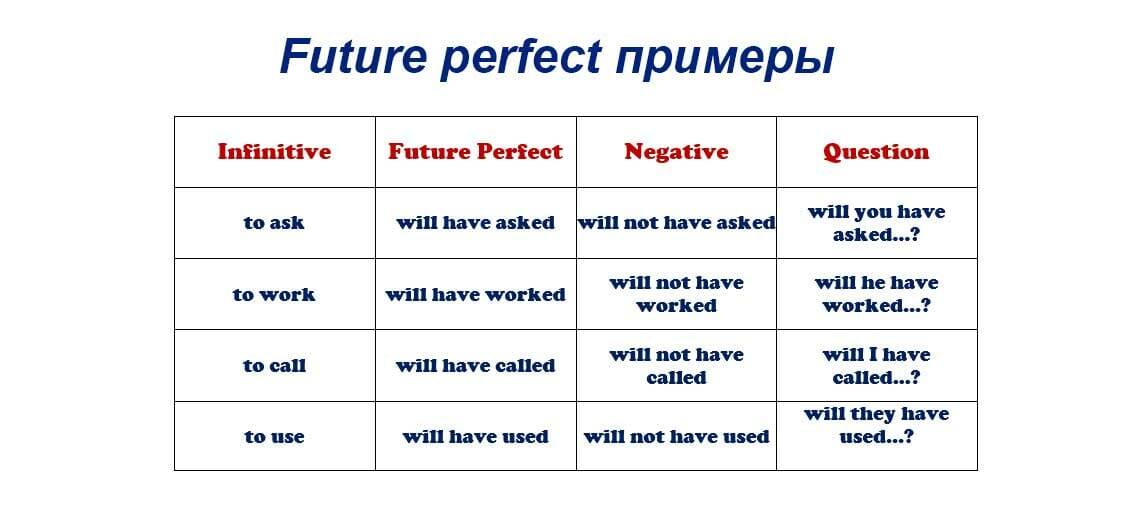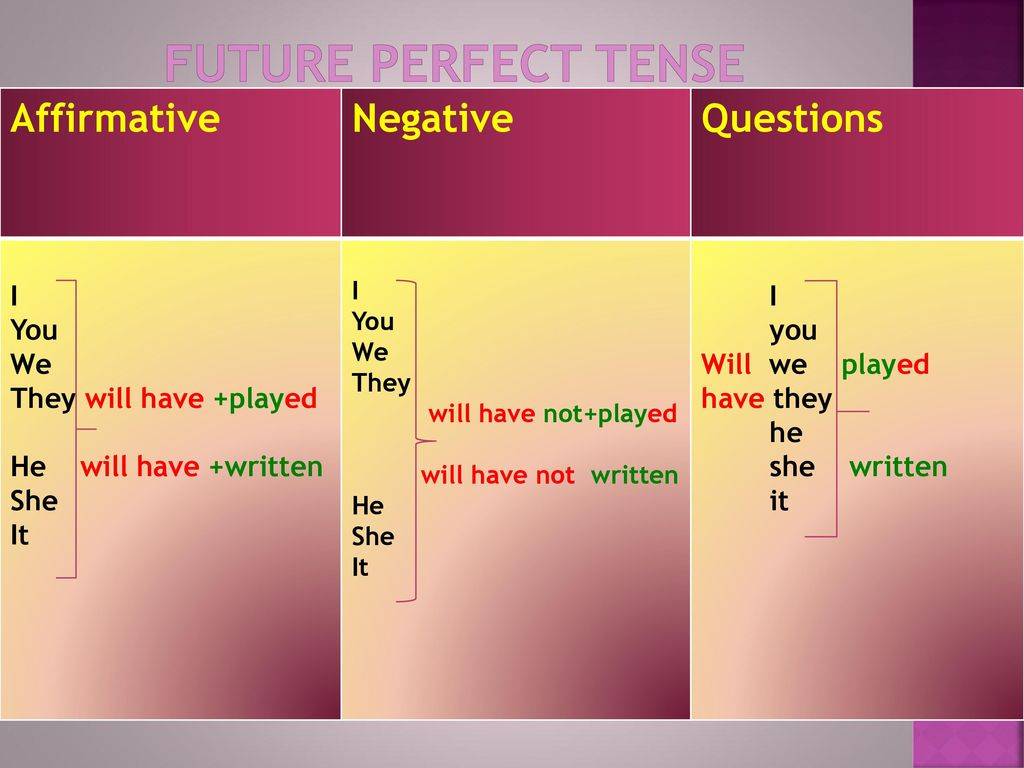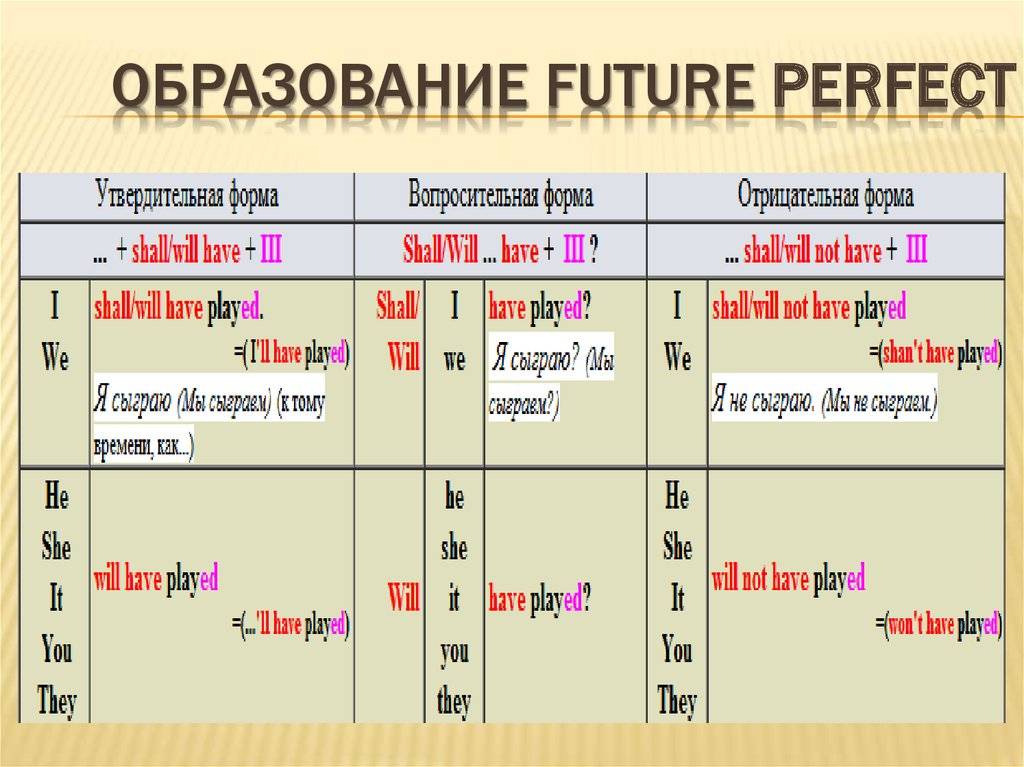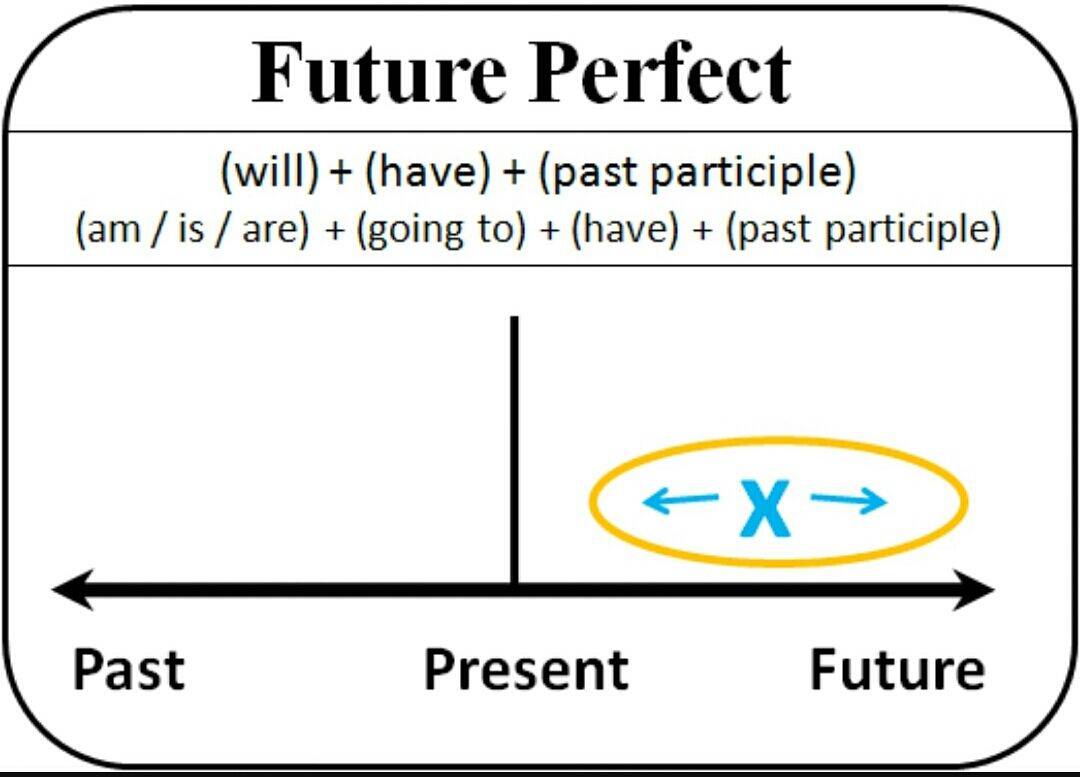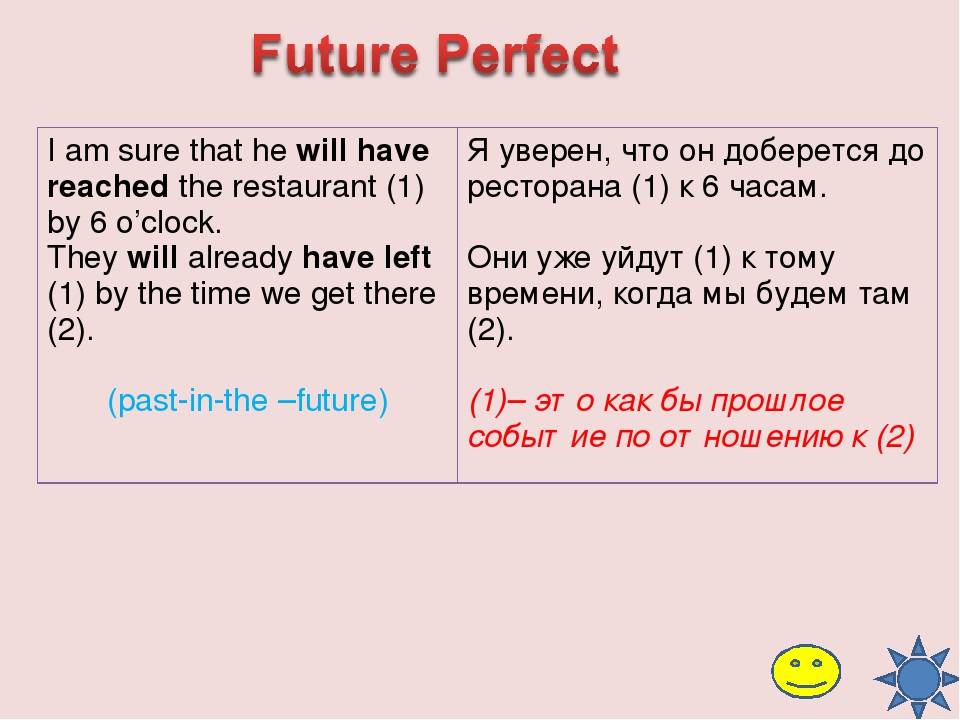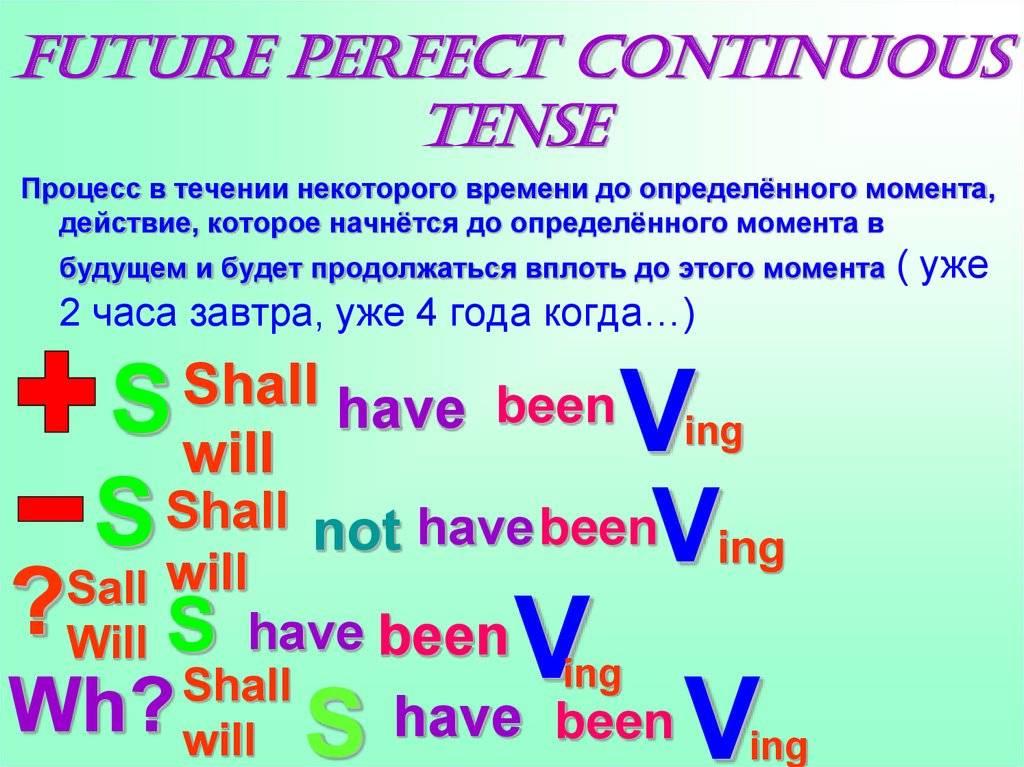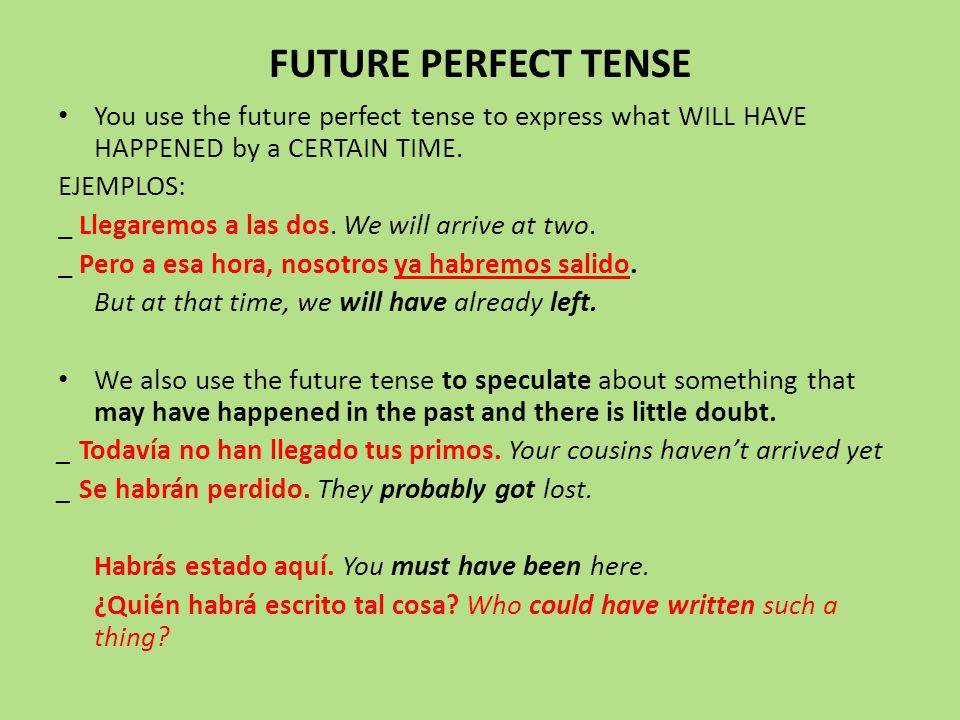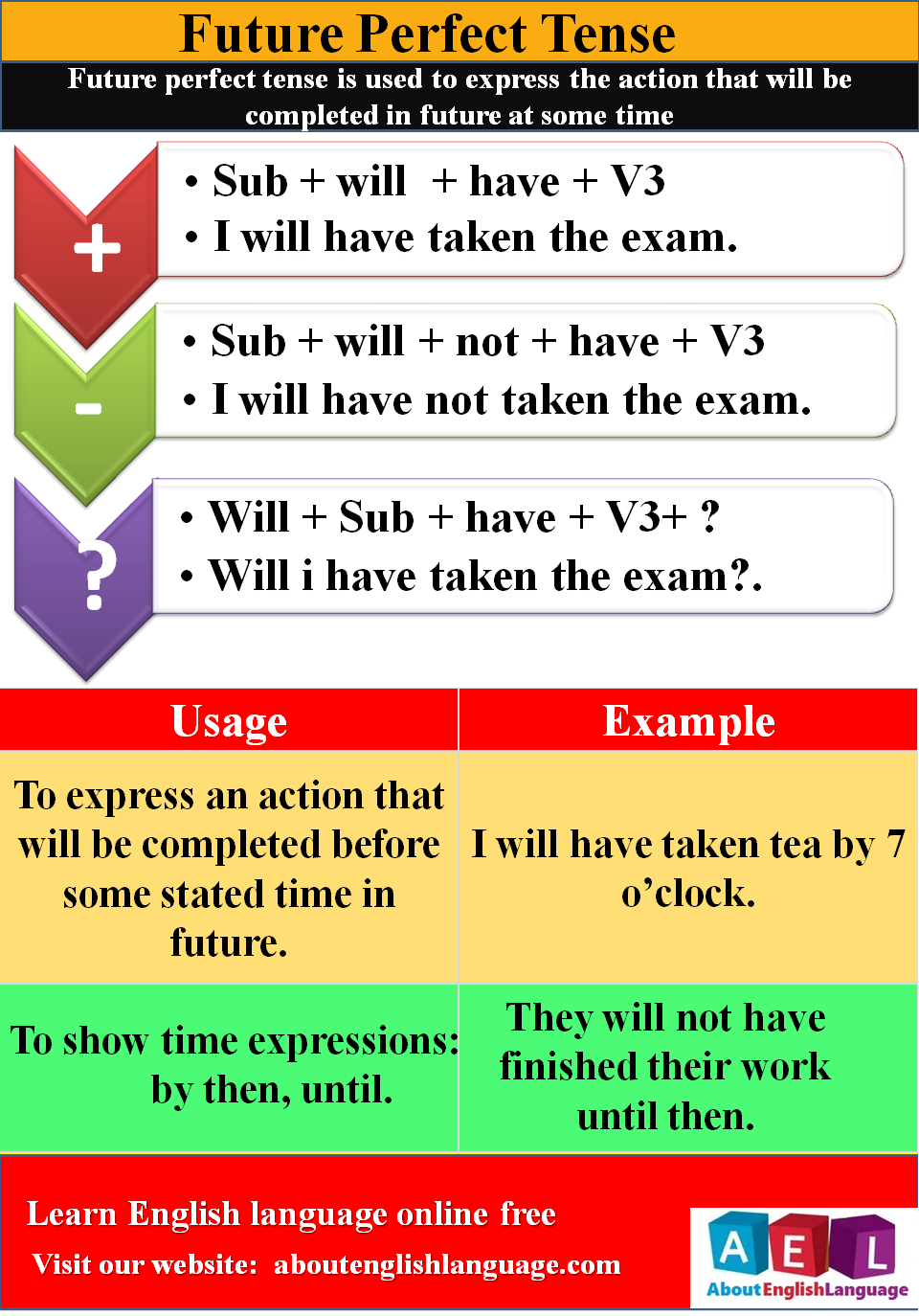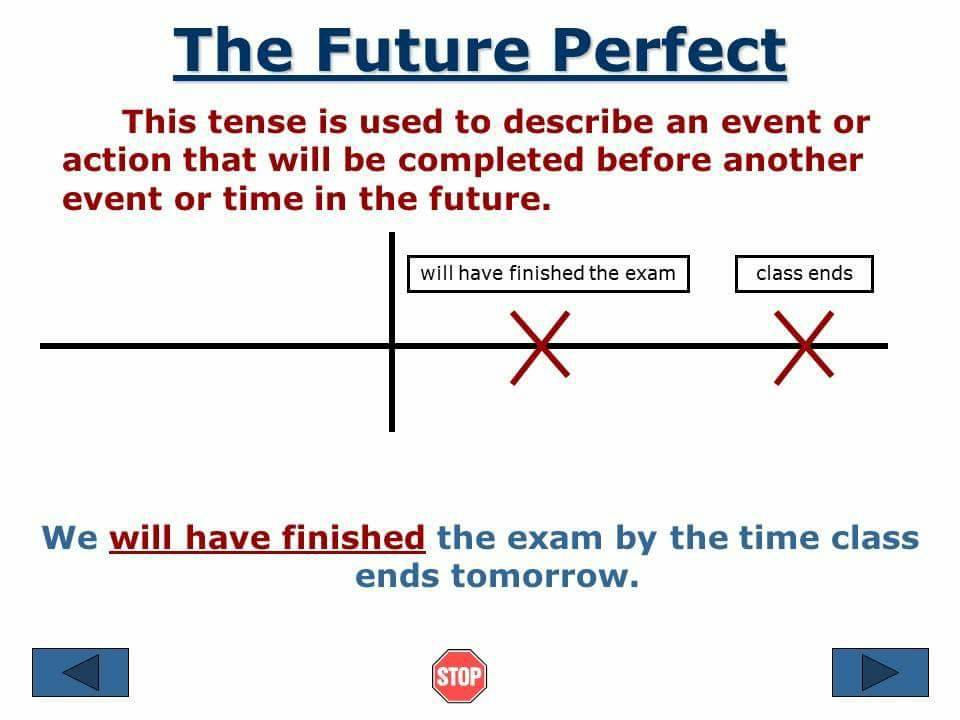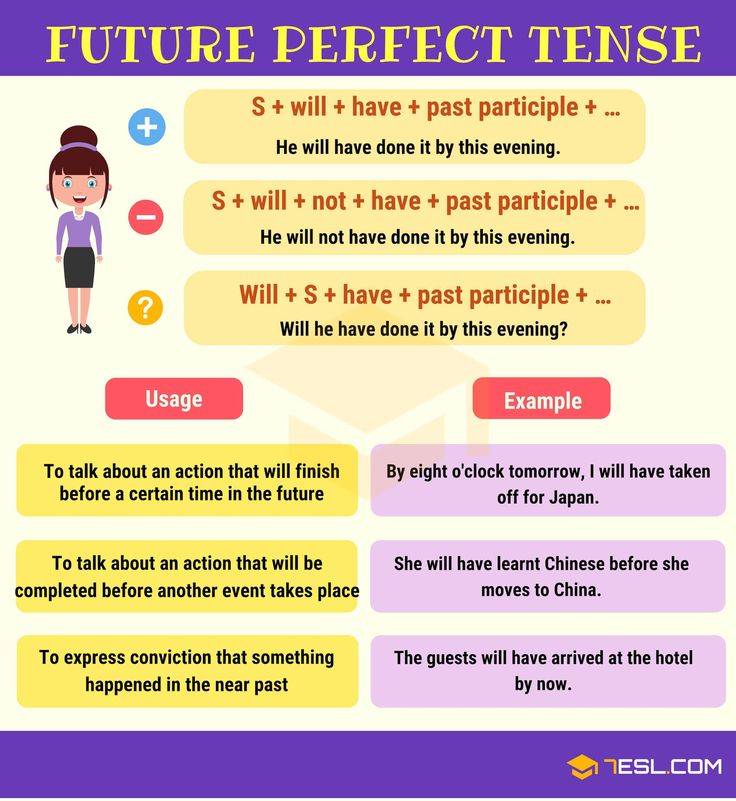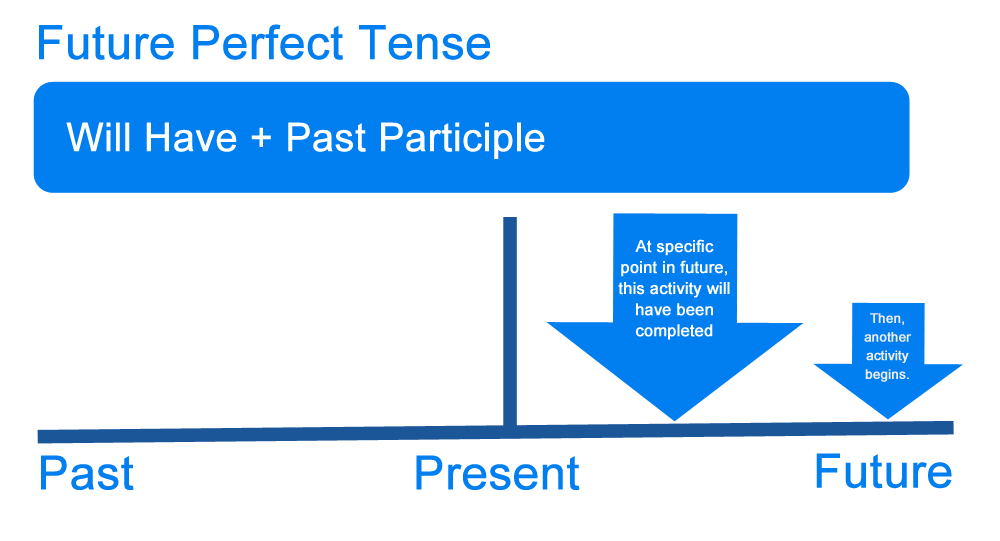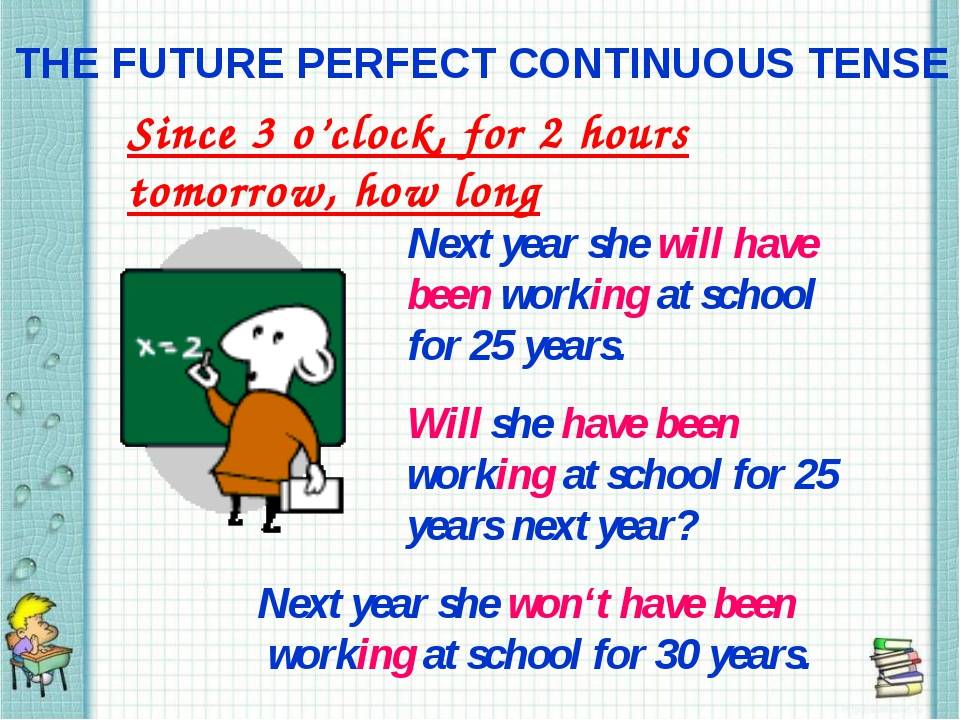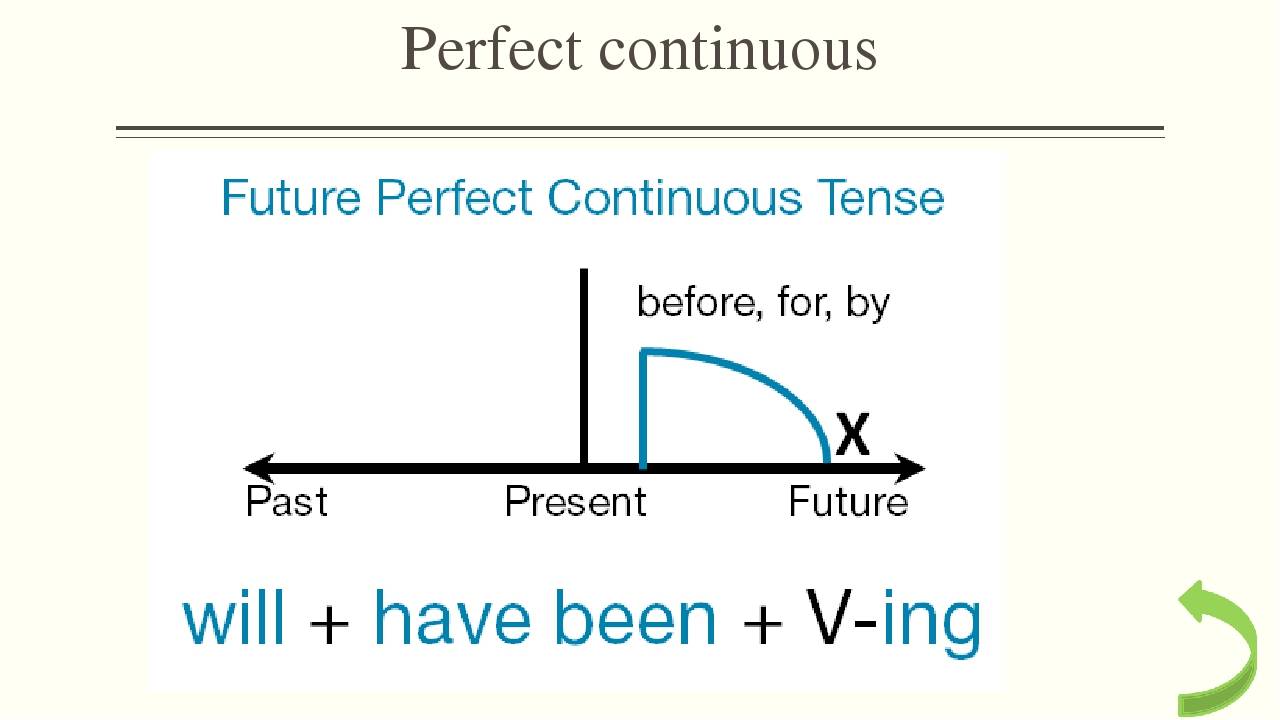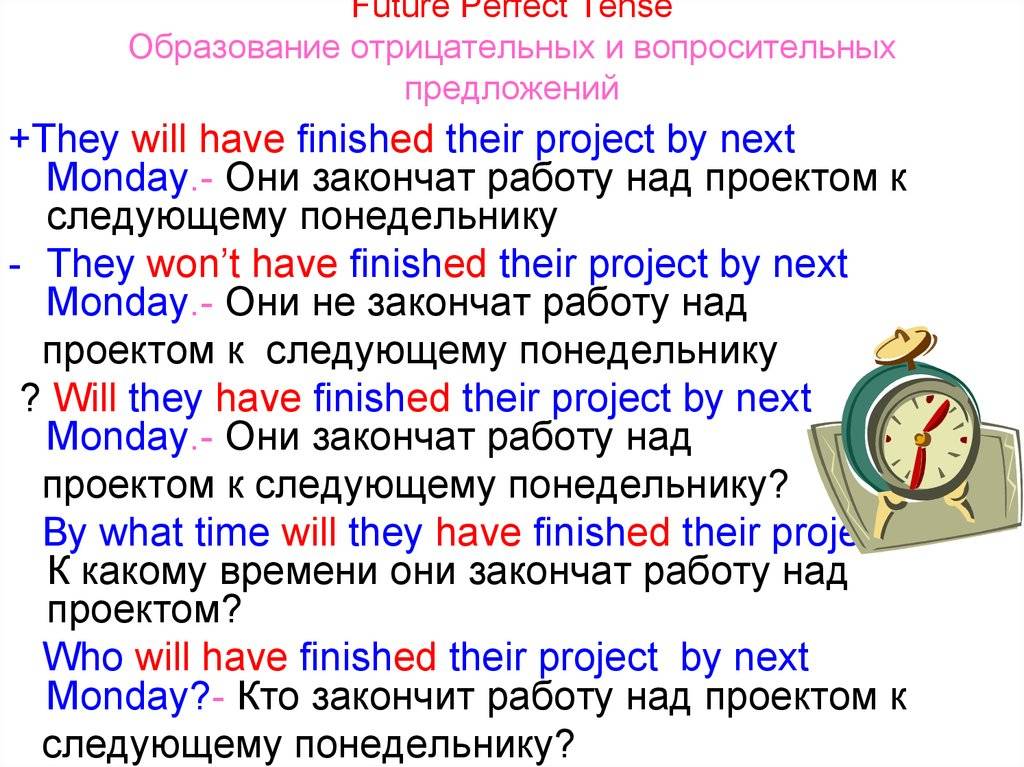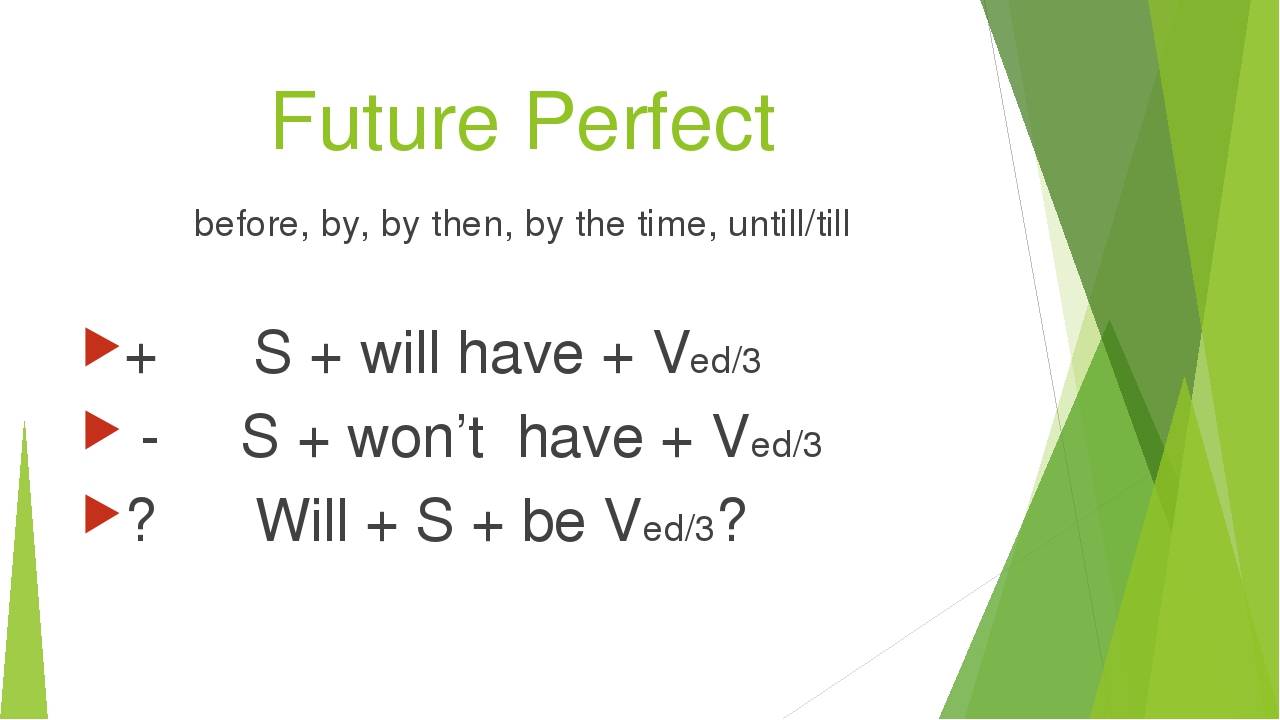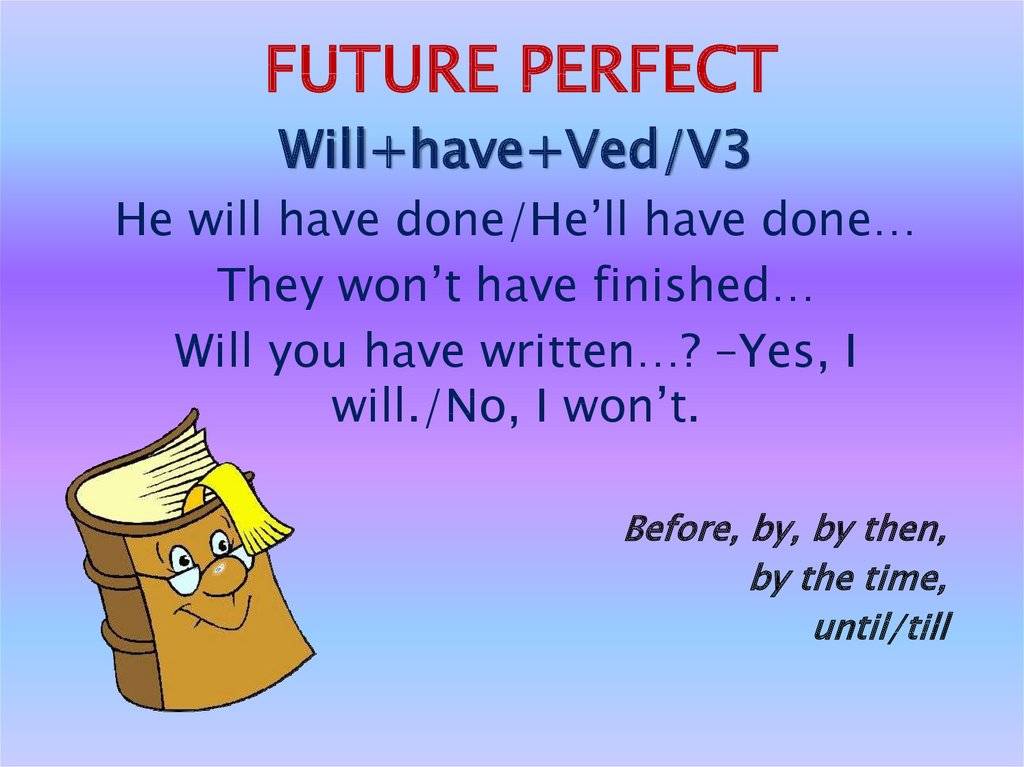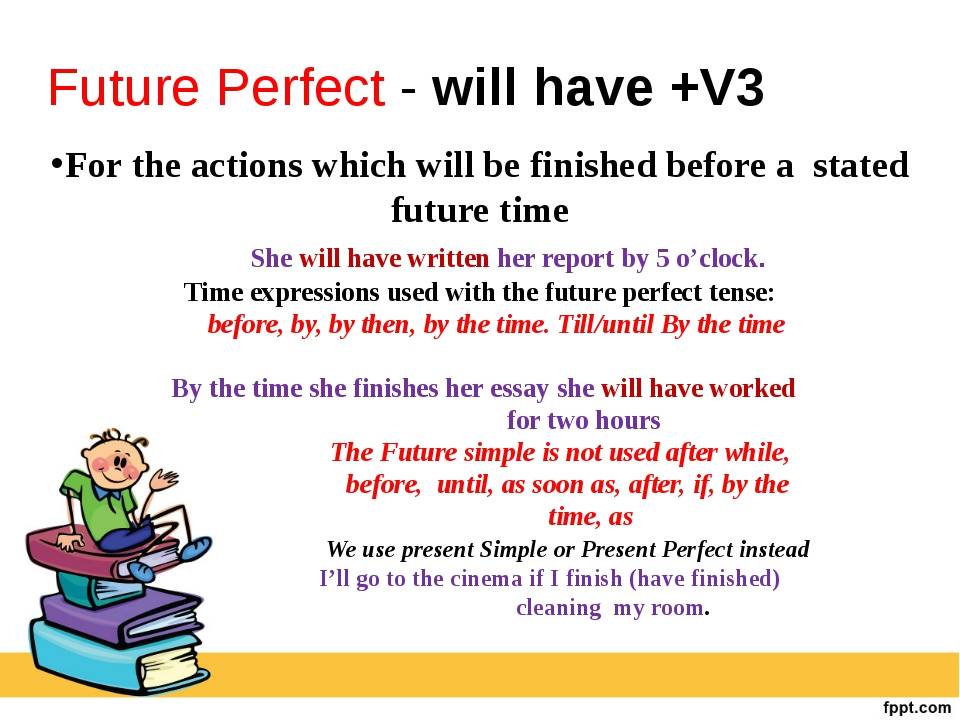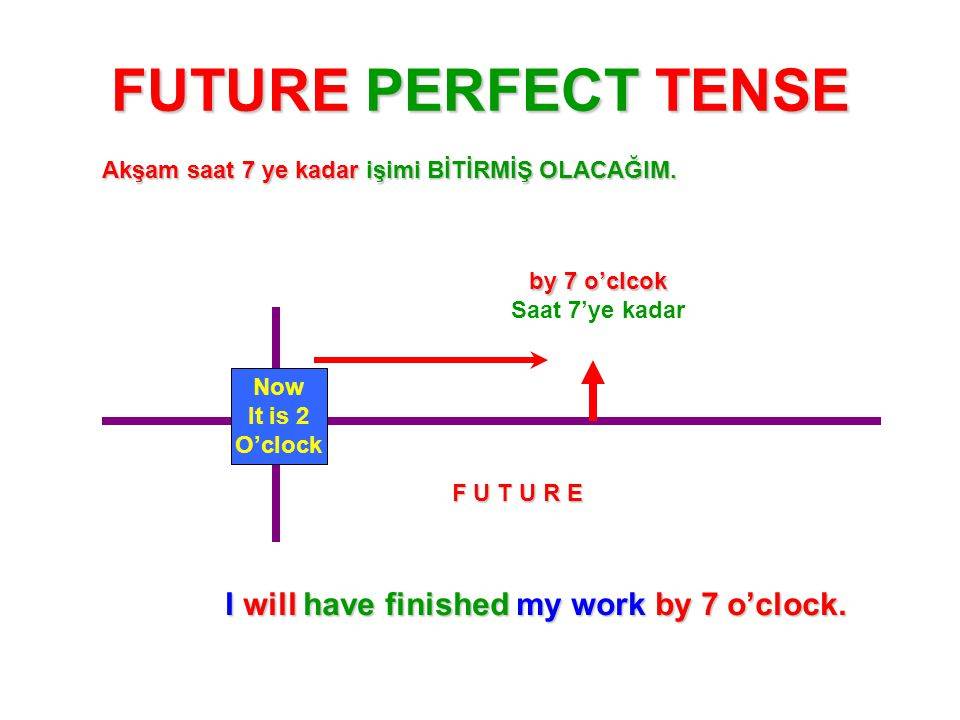How To Proceed
-
1
Introduce the Future Perfect with a timeline
Several of the more complex tenses, are best understood when we place events within a timeline. And this is precisely the case with the future perfect. We use this tense to say an action will be finished at a certain time in the future. So, draw a timeline on the board, one that starts with today and extends towards the near future. Below write several examples of things that will happen soon, but before the Christmas holidays.- Juan will finish a project.- He will take some exams.- He will plan a ski trip to Aspen. Mark these events in your timeline in the right order. Say, “By the end of this year, John will have finished his project. He will have taken some exams. He will have planned a ski trip to Aspen.” Make sure students understand these actions will be finished by a specific time (the end of the year). Illustrate how the future perfect tense is formed: will + have + past participle (for all persons)
-
2
Practice the Future Perfect tense
Ask your students to give you more examples of things they’ve planned for the rest of the school year: S: I will learn to drive. I will get my driver’s license. I will drive to Disney World. T: When you drive to Disney world, you will have known how to drive for only a few weeks. Ask students to provide more examples. It can be anything they foresee happening in the near future: By the time, we finish this course, I will have turned 18. When I graduate from high school, I will have decided where to go to college. You may also tell them they can make predictions for the future; they may get as bold as they wish:By the time I’m 40, I will have become CEO of an important company. Give your students this worksheet where they have to make predictions about Life in 2015.
-
3
Introduce the Future Perfect tense – Negative forms
Give examples of negative statements, based on the information your students have shared: Juan, by the time you finish this course, you won’t have turned 20; you will have turned 18. Sarah, when you graduate from high school, you won’t have decided where to apply for a job; you will have decided where to go to college. Ask students to provide more examples by predicting the future: By the time I finish college, I won’t have gotten married.
-
4
Introduce the Future Perfect tense – Interrogative forms
Ask students questions about what they expect in their future:T: Will you have graduated from college by the time you’re 22? S: No. T: Ask a classmate! S: Carlo, will you have graduated from college by the time you’re 22? Model a few more questions, then, have students come up with questions on their own. In the Life in 2015 worksheet, students also interview a character and ask him questions in future perfect.
-
5
Introduce the Future Perfect tense – Short answers
Have students ask you questions and introduce short answers:S: Will you have retired from teaching in 2020? T: Yes, I will/No, I won’t. Students now take turns asking each other questions and replying with short answers.
-
6
Provide plenty of opportunities for extended practice
If students are not given chances to extensively practice the future perfect tense, chances are they won’t feel confident enough to use it. Try some of the exercises and activities found in our Future Perfect section. Here you’ll also find worksheets that contrast the different future tenses to boost their confidence.
Future perfect continuous
Positive statement: I will have been writing (I’ll have been writing), he will have been studying (he’ll have been studying)
Negative statement: I will not have been doing (I won’t have been doing)
Questions: Will you have been travelling?
Neg. questions: Will you not have been dancing? (Won’t you have been dancing?)
We use the future perfect continuous tense for activities that will continue until a point of time and will not be completed. It is also normally used with by or other time expressions and future events.
I’ll go home on 20 June. By then I’ll have been staying at this hotel for a fortnight.At six o’clock we’ll have been waiting here for three hours.When you arrive, we’ll have been sitting in the classroom all day.
Compare the simple and continuous tense
The continuous tense is used for incomplete, uninterrupted actions. If we refer to a number of individual events or events that were repeated, we must use the simple.
When I am sixty, I’ll have been building houses for thirty years. (one incomplete activity)When I am sixty, I’ll have built more than fifty houses. (fifty individual actions)By 5 o’clock I’ll have been washing this car for an hour and a half. (one uninterrupted activity)By 5 o’clock I’ll have washed this car and replaced the tyres. (two completed activities that will be done one after another)
In this respect they are similar to other English tenses, which you can study on this website to get more examples.
Как образуется Future Perfect
Утверждение
Утвердительное предложение в Future Perfect строится с помощью вспомогательного глагола have во времени Future Simple (will have) и третьей формы основного глагола.
| I/He/She/It/We/You/They + will have + 3-я форма глагола | |
|---|---|
|
I will have finished. – Я закончу.
He will have decided. – Он решит. |
We will have arrived. – Мы прибудем.
You will have confirmed. – Вы подтвердите. They will have received. – Они получат. |
Отрицание
В отрицательном предложении мы ставим между will и have отрицательную частицу not.
| I/He/She/It/We/You/They + will not have + 3-я форма глагола | |
|---|---|
|
I will not have finished. – Я не закончу.
He will not have decided. – Он не решит. |
We will not have arrived. – Мы не прибудем.
You will not have confirmed. – Вы не подтвердите. They will not have received. – Они не получат. |
В разговорной речи вспомогательный глагол will have чаще встречается в сокращенной форме. В утвердительном предложении эта форма будет звучать как ‘ll have:
- She’ll have painted.
- You’ll have confirmed.
В отрицательном – won’t have:
- It won’t have produced.
- We won’t have arrived.
Вопрос
В вопросе мы выносим на первое место will, затем используем подлежащее, после него – have и 3-ю форму основного глагола.
| Will + I/he/she/it/we/you/they + have + 3-я форма глагола | |
|---|---|
|
Will I have finished? – Я закончу?
Will he have decided? – Он решит? Will she have painted? – Она нарисует? Will it have produced? – Оно произведет? |
Will we have arrived? – Мы прибудем?
Will you have confirmed? – Вы подтвердите? Will they have received? – Они получат? |
Время Future Perfect не изучают на начальной ступени, поэтому мы разделили его функции только на два блока. Желтый блок предназначен для тех, у кого средний уровень знаний, красный – для тех, у кого высокий.
Где встречается Future Perfect
Средний уровень
Время Future Perfect – это аналог Present Perfect и Past Perfect для будущего действия.
Время Future Perfect показывает действие, которое завершится к определенному моменту в будущем. Момент в будущем передается с помощью специальных слов: by… (к какому-то времени/моменту), by the time (к тому времени как), by then (к тому времени), by tomorrow (к завтрашнему дню, до завтра), before (перед тем как), when (когда), until/till (до того как). Until и till используются только в отрицательных предложениях.
Не забывайте, что после союзов when, before, until/till мы используем настоящее время, даже если ситуация относится к будущему.
Сложные случаи употребления Future Perfect
Высокий уровень
У времени Future Perfect есть еще одна функция, которая не связана с будущим временем. Future Perfect используется как аналог конструкции must have done. В этом значении Future Perfect показывает предположение, что действие было выполнено. На русский язык такое предложение будет переводиться прошедшим временем со словами «возможно», «вероятно», «должно быть».
Future Perfect – время, способное удивить неожиданным значением. Как видите, у него всего две функции, поэтому изучить его не составит труда. Чтобы оно хорошо осело в вашей памяти, пройдите тест и сохраните таблицу с образованием будущего совершенного времени в английском языке.
↓ Скачать таблицу употребления времени Future Perfect (*.pdf, 187 Кб)
ТестFuture Perfect – совершенное будущее время в английском языке
Exercise 2. Поставьте глаголы в скобках в the Future Perfect Tense.

- Mike … (to prepare) all the calculations by the end of his working day tomorrow.
- I… (to learn) some phrases in Japanese by the time the participants of the Japanese delegation arrive.
- The chef … (to cook) all the dishes by the time the banquet begins.
- The secretary … (to arrange) all the papers by the time the boss comes to the office tomorrow.
- The ferry … (to reach) the port by 4 o’clock tomorrow.
- They … (to deliver) our pizza by the beginning of the party tomorrow.
- Jack and Monica … (to send) all the invitations by next Tuesday.
- I … (to read) your report by tomorrow morning.
- The workers … (to unload) the lorries by the end of their working day.
- We … (to analyse) the results of the experiment by next Friday.
Answers: 1. Mike will have prepared all the calculations by the end of his working day tomorrow. 2. I will have learned some phrases in Japanese by the time the participants of the Japanese delegation arrive. 3. The chef will have cooked all the dishes by the time the banquet begins. 4. The secretary will have arranged all the papers by the time the boss comes to the office tomorrow. 5. The ferry will have reached the port by 4 o’clock tomorrow. 6.They will have delivered our pizza by the beginning of the party tomorrow. 7. Jack and Monica will have sent all the invitations by next Tuesday. 8. I will have read your report by tomorrow morning. 9. The workers will have unloaded the lorries by the end of their working day. 10. We will have analysed the results of the experiment by next Friday.
Future Tenses
| Simple Future |
|---|
|
The simple future tense is used for an action that will occur in the future. More…(opens new tab) |
|
I will base form you will base form he/she/it will base form we will base form you will base form they will base form |
| Future Progressive Tense |
|---|
|
The future progressive tense is used for an ongoing action that will occur in the future. More…(opens new tab) |
|
I will be present participle you will be present participle he/she/it will be present participle we will be present participle you will be present participle they will be present participle |
| Future Perfect Tense |
|---|
|
The future perfect tense is used to describe an action that will have been completed at some point in the future. |
|
I will have past participle you will have past participle he/she/it will have past participle we will have past participle you will have past participle they will have past participle |
Future Perfect: формы предложения
Теперь же перейдем к формам предложения, чтобы понять, как употреблять образованные глаголы.
Утвердительные предложения в Future Perfect
Утвердительная форма предложений в Future Perfect Tense строится по стандартной формуле: вспомогательный и смысловой глаголы следуют после подлежащего.
| Subject
(Подлежащее) |
Verb
(Глагол) |
Secondary parts of the sentence (Второстепенные члены предложения) | |
| Вспомогательный глагол | Третья форма
глагола |
||
| They
Они |
will have regretted
будут сожалеть |
about their actions.
о своих действиях. |
|
| I
Я |
will have released
выпущу |
a song.
песню. |
|
Не стоит забывать, что английские глаголы могут выражаться в действительном залоге (the Active Voice) и страдательном залоге (the Passive Voice). В примерах выше глаголы используются в действительном залоге. В таких предложениях подлежащее совершает какое-либо действие. Однако для того, чтобы показать, что подлежащее подвергается чьему-либо воздействию, необходимо применять the Passive Voice.
Future Perfect Passive образуется путем добавления глагола to be в третьей форме (been) перед смысловым глаголом:
| The album will have been come out. | Альбом выйдет. |
| The action will have been completed. | Действие будет завершено. |
| Your dream will have been realized. | Ваша мечта будет реализована. |
Отрицательные предложения в Future Perfect
В отрицательной будущей форме между will и have употребляется отрицательная частица not:
| Подлежащее | Вспомогательный глагол | Частица not | Вспомогательный глагол | Третья форма
глагола |
Второстепенные члены предложения |
| Adam | will | not | have | done | this. |
| Адам этого не сделает. |
Правило сохраняется и для предложений с Passive Voice:
| The expectations will not have been justified. | Ожидания не будут оправданы. |
И в утвердительной, и в отрицательной формах в речи часто используются следующие сокращения:
| Полная форма | Сокращенная форма | |
| +
утверждение |
I will have escaped.
She will have managed. They will have observed. |
I’ll have escaped.
She’ll have managed. They’ll have observed. |
| —
отрицание |
We will not have written.
It will not have been noticed. You will not have decided. |
We won’t have written.
It won’t have been noticed. You won’t have decided. |
Вопросительные предложения в Future Perfect
Вопросительная форма образуется исходя из типа вопросов:
Для общего вопроса порядок слов меняется: вспомогательный глагол will встает перед подлежащим:
| Вспомогательный глагол | Подлежащее | Вспомогательный глагол | Третья форма
глагола |
Второстепенные члены предложения |
| Will | they | have | found | the documents? |
| Они найдут документы? |
Такие вопросы нуждаются в коротком ответе:
| Yes, they will have. | Да, найдут. |
| No, they won’t have. | Нет, не найдут. |
Порой на такие вопросы могут ответить и полностью. Общий вопрос с Passive Voice для примера:
| — Will the target have been detected?
— Yes, it will have been detected. |
— Будет ли обнаружена цель?
— Да, она будет обнаружена. |
Альтернативные вопросы практически не отличаются от общих. В них лишь присутствует второе подлежащее, смысловой глагол или другой член предложения для предоставления выбора, который соединяется с первым словом союзом or. Формула для наглядности:
| Альтернативный вопрос
(в данной схеме к подлежащему) |
|||||
| Вспомогательный глагол | Подлежащее | Союз
or |
Подлежащее | Вспомогательный глагол | Третья форма
глагола ? |
| Will | you | or | they | have | come? |
| Придете вы или они? |
Такой вопрос требует полный ответ:
| We will have come. | Мы придем. |
| They will have come. | Они придут. |
| Neither we nor they will have come. | Ни мы, ни они не придут. |
| Both we and they will have come. | И мы, и они придут. |
В специальных вопросах сохраняется форма общего вопроса, но перед вспомогательным глаголом will добавляются вопросительные слова:
| Вопросительное слово | Вспомогательный глагол | Подлежащее | Вспомогательный глагол | Третья форма
глагола |
Второстепенные члены предложения |
| Where | will | she | have | been | by then? |
| Где она будет к тому времени? |
Специальные вопросы также нуждаются в развернутом ответе:
| She will have been in Miami. | Она будет в Майами. |
Разделительный вопрос отличается от всех других, так как в нем сохраняется утвердительная или отрицательная форма предложения, к которой добавляется краткий вопрос.
| Подлежащее | Вспомогательный глагол | Третья форма
глагола |
Вспомогательный глагол, |
Краткий вопрос |
| Erin | will | have | written, | won’t she? |
| Эрин напишет, не так ли? |
В таком вопросе ответ будет содержать только вспомогательный глагол will have:
| + | Yes, she will have. | Да, напишет. |
| — | No, she won’t have. | Нет, не напишет. |

